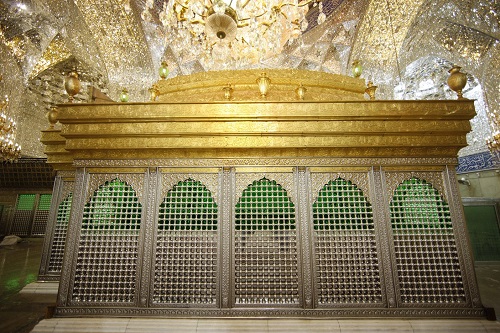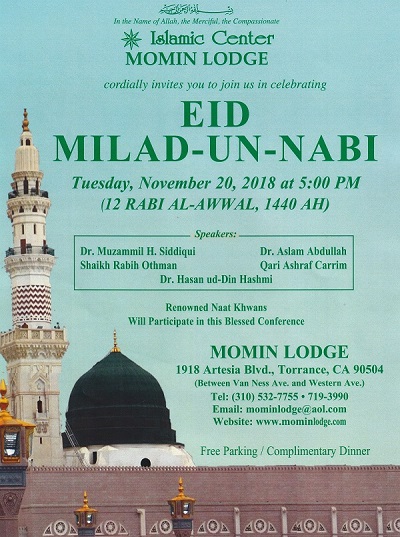The tenth day of Muharram (the first month of lunar calendar) has a great significance in the history of Islam. Thirteen hundred and fifty two years ago on this day in the year 61 A.H., the grandson of the Prophet Muhammad (PBUH), Husayn ibn ‘Ali, offered a unique sacrifice at the ground of Karbala to protect the Islamic principles. Husayn was a man of great faith and noble character. He was not only a biological descendant of the Prophet, but an heir of his religious and spiritual legacy also. It was not possible for him to accept a person, openly violating the teachings of Islam, such as Yazid, as a head of the Islamic State. Husayn was well aware of his own status. He knew that if a man of his caliber offered the pledge of allegiance to a transgressor ruler it would cause a tremendous damage to the future of Islam. He was bound to protect this great religion. So he served his mission at the cost of his life. He offered a unique testimony about the principles of Islam that they were so sacred and holy that every thing could be sacrificed for their protection.
Husayn was born on 5th of Sha’ban (the 8th month of lunar calendar), 4 A.H. at the Arabian Peninsula’s city of Medina. His father was ‘Ali ibn Abu Talib, the commander of the believers and first cousin to the prophet, while his mother was Fatimah, the Prophet’s most beloved daughter. Husayn had the privilege of being brought up in a very auspicious Islamic environment. His heart and mind were brightened during the very early young age by the light of God consciousness. The Prophet passed away in Rabi al-Awwal (the 3rd month of lunar calendar), 11 A.H. Husayn then was six and half years old. This early age of childhood is a very crucial point in the development of a person’s thought and conduct. After the Prophet’s death, when the period of caliphate started, Husayn had opportunity to watch very closely the reign of all the four “Rightly guided Successors”, Abu Bakr, Umar, Uthman, and ‘Ali. Especially during the reign of his own father, Ali, the fourth successor of the Prophet, he participated actively in the Islamic state’s affairs. After the death of Ali in Ramadan 40 A.H., when Hasan ibn Ali was chosen as a caliph, Husayn became his right hand. In the sixth month of Hasan’s caliphate, Mu’awiyah ibn Abu Sufyan, the governor of Syria, marched toward Kufah in order to attack Hasan. However, after a series of negotiations, a treaty was signed between them in the last week of Rabi al –Awwal 41 A.H. According to that agreement Hasan had to give up his authority in favor of Mu’awiyah, and after his death Hasan would be the ruler of the whole Muslim Empire. Husayn was not happy with this agreement. Nevertheless, he obeyed his older brother and accepted it. After eight years of this truce, in 49A.H, Hasan was poisoned in mysterious circumstances. After his death, the course of succession was clear for Mu’awiyah’s only son Yazid. In 50 A.H., one year after Hasan’s death, Mu’awiyah decided to nominate his son Yazid as a successor. In 53 A.H. he started taking oath of allegiance for him. Many pious Muslims were extremely disappointed by this decision because it was the first time in the history of Islam when any head of the Islamic State appointed his own son as his successor. Another shocking point about this decision was Yazid’s corrupt life and malevolent character.
In Rajab, 60 A.H., Mu’awiyah passed away and Yazid took control of the Muslim empire. At that time Husayn was residing atMedina. Yazid wrote a letter to the governor of Medina to take the pledge of allegiance from Husayn. The governor called him and informed him about the letter. Husayn did not agree to give his pledge and asked him for some time. It was Friday, 26th of Rajab, 60 A.H. The next day (27th of Rajab) he stayed at home and planned to leave Medina. The following night he left Medina and headed towards Makka along with his wives, children, some younger brothers and a few other relatives. Before leaving Medina, Husayn discussed the future plans and other important matters with his younger brother, Muhammad ibn ‘Ali ibn al-Hanafiyyah. Further more, he entrusted Muhammad with some very important responsibilities, then left him behind in Medina. When the news of Husayn’s journey to Mecca reached Kufah, which was the stronghold of Ali’s supporters, the people of that city invited him to move there. Thereupon, on the 8th of Zul Hijjah 60A.H. Husayn set out for Kufah. When he reached the field of Karbala, few miles outside of Kufah, Yazid’s army surrounded him. They asked him to surrender unconditionally and accept the pledge of allegiance to Yazid, but Husayn refused it. They were proud of their large army and vast material power. When they looked at the small number of Husayn’s men they considered him very weak. They could not realize that the real power of Husayn rested in his love for Allah, and devotion to the teachings of Islam.
On the tenth of Muharram 61A.H, the army of Yazid attacked Husayn and started the brutal assassination of his men. They killed his sons, nephews, brothers, other relatives and companions. They looted the tent of his ladies. But they could not shake the unparalleled strength of Husayn’s faith. At the end they assassinated Husayn, the only grandson of the prophet on the earth. They killed Husayn but, with all their brutality and oppression, they could not bend him before their transgressor ruler.
Husayn was a symbol of faith and good conduct. He was the most eminent believer of his time. His character served as a role model for the nation of Islam. If he had surrendered before the evil ruler Yazid, it would have been a confirmation of his wicked deeds which would ruin the spirit of Islam.
Great people have great responsibilities. It is very easy for an ordinary person to accept those as rulers who are rebels against the laws of Allah. However, a great person like Husayn could not tolerate it. His nature was a reflection of faith, God-consciousness, and righteousness. He was brought up in such a sanctified environment where even a slight hint of mischief was not permissible.
Husayn was trained for a great job of serving the principles of Islam in their true spirit with sincerity, devotion, courage, and patience. His heart was enlightened by the love of Allah. The divine pleasure in his sight was superior to every other thing. To him, the real success of life rested in the obedience of Almighty Allah. Therefore, he sacrificed his life to stop the brush fire of obscenity and impiety from spreading and burning the garden of Islam.
It must be kept in mind that the time, in which this incident occurred, was the first century of Islam. The Holy Prophet Muhammad (PBUH) left his worldly life just fifty years ago; and a good number of his companions were still alive. Therefore, the practices of that period were model of conduct for the coming generations. If the wicked character of that time’s evil ruler were silently tolerated it would have destroyed the future of Islam. Husayn sacrificed his life but succeeded to save the line between right and wrong. This was the real success. Husayn was victorious because he succeeded to protect his principles. The oppressor Yazid was clearly loser because he failed to bend the neck of truth before his obscenity and wickedness. It is difficult to understand the nature of Husayn’s great victory for those in whose sight the material comfort and pleasure is everything.
This life is temporary, one day, earlier or later, everyone has to leave this world. But successful are those who live in Allah and die for Allah.


